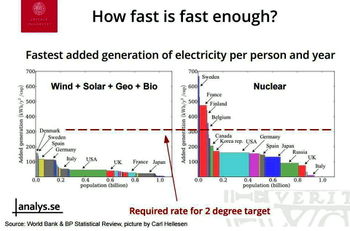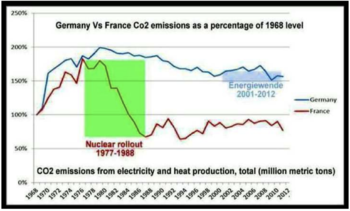Energy policy and global warming: Difference between revisions
Jump to navigation
Jump to search

imported>David MacQuigg No edit summary |
imported>David MacQuigg No edit summary |
||
| Line 1: | Line 1: | ||
{{subpages}} | {{subpages}} | ||
{{Image|Countries CO2 targets.jpg|right|350px|Add image caption here.}} | |||
{{Image| | National energy policies have had a profound effect on success in reducing CO2 emissions. Some countries have made substantial progress in meeting the goals they have agreed to. Very few are moving fast enough to limit global warming to 2 degrees C. This article will examine the results of these national policies. | ||
{{Image|Low-carbon-share-energy.png|left|350px|Add image caption here.}} | |||
{{Image|Germany France CO2.png|center|350px|Add image caption here.}} | {{Image|Germany France CO2.png|center|350px|Add image caption here.}} | ||
{{Image| | {{Image|Alastair McIvor.png|right|350px|Add image caption here.}} | ||
Revision as of 02:17, 3 January 2022
National energy policies have had a profound effect on success in reducing CO2 emissions. Some countries have made substantial progress in meeting the goals they have agreed to. Very few are moving fast enough to limit global warming to 2 degrees C. This article will examine the results of these national policies.
File:Low-carbon-share-energy.png
Add image caption here.
File:Alastair McIvor.png
© Image: Alastair McIvor
Add image caption here.
Add image caption here.

